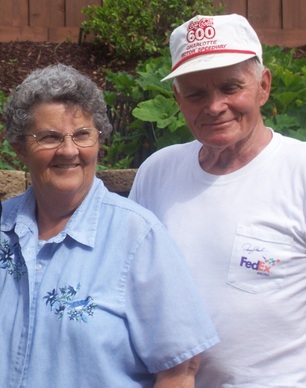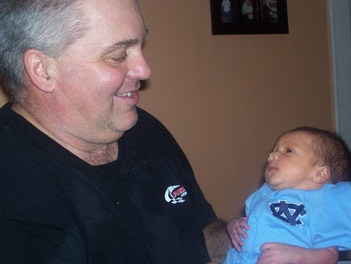Interview with Grandmother

Anna Clark and her husband, Edward Clark. (Clark D, 2010)
Interviewee: Anna Clark Date: Sept. 26, 2012
What religion were there in Berkshire?
There were a bunch of religions but only one church, the white Methodist Church down the road. This is the place where everyone met on Sundays. It didn't matter what religion you were.
What did you do as a community?
We had a lot of family/friend get-togethers, were people would come from different counties and even from Switzerland.
The church – hosted a box social, where families would fix a box dinner, take it to the church and the men would bid on them.
There were also Grange meetings in the town of Berkshire. They held suppers and pitched horse shoes tournaments inside.
They also had community square dances that were held in anybody's barn. This would go from 8 PM to 1 AM.
At the community building, they showed Western movies that your grandfather and I would go to see.
Where did you get your food?
We raised chickens, pigs, cows and rabbits. We also raised their own vegetables. We canned everything, even the beef. We also grounded up our meat that we got from our cows and pigs. The only things that we ever bought from the store were crackers, bread and cereal.
Why do you think the farmlands decreased?
They decreased because of the raising of taxes on the land.
How is the economy?
My dad sold his calves and the milk to make a living. The train ride only cost $1.00 to go to Owego, New York and the movie only cost $.25. The movies at the community building were only $.35 and an ice cream cone was $.05.
What kind of transportation did you use?
I remember my dad having a really old car. Your grandfather used the train to go to the movies in Owego, New York. In order for me and my sister to tap dance, we had to hitch a ride in the back of a milk truck to get to the dance studio in Owego.
How long have you lived in Berkshire?
We moved from Binghamton, New York after my father sold his milking plant in 1937. I have lived in East Berkshire since I was five. I lived there from 1937 to 1982, 45 years. I have lived on a farm all my life, that's how we made a living. Our family, both from England and Switzerland, has lived in East Berkshire for 5 generations. My husband and I moved down to Concord, North Carolina in 1982 and we have been living here for 30 years.
What did you do for fun?
There wasn't really any place to go. We played baseball, with a stick and a ball, in the cow pastures, using the cow patties as bases. We also used to go down to the creek to swim. Your grandfather and I also loved to go square dancing at the community building. We went to the Tioga County fair and also the Cortland County fair.
How was it during the Great Depression?
There were people who had lost their homes and began walking the railroad tracks. My mom would give them what food she could but wouldn’t allow them to come in. She did it as a safety precaution. Your grandfather’s family was more bombarded by them because he lived right next to the railroad tracks that went through Berkshire.
What religion were there in Berkshire?
There were a bunch of religions but only one church, the white Methodist Church down the road. This is the place where everyone met on Sundays. It didn't matter what religion you were.
What did you do as a community?
We had a lot of family/friend get-togethers, were people would come from different counties and even from Switzerland.
The church – hosted a box social, where families would fix a box dinner, take it to the church and the men would bid on them.
There were also Grange meetings in the town of Berkshire. They held suppers and pitched horse shoes tournaments inside.
They also had community square dances that were held in anybody's barn. This would go from 8 PM to 1 AM.
At the community building, they showed Western movies that your grandfather and I would go to see.
Where did you get your food?
We raised chickens, pigs, cows and rabbits. We also raised their own vegetables. We canned everything, even the beef. We also grounded up our meat that we got from our cows and pigs. The only things that we ever bought from the store were crackers, bread and cereal.
Why do you think the farmlands decreased?
They decreased because of the raising of taxes on the land.
How is the economy?
My dad sold his calves and the milk to make a living. The train ride only cost $1.00 to go to Owego, New York and the movie only cost $.25. The movies at the community building were only $.35 and an ice cream cone was $.05.
What kind of transportation did you use?
I remember my dad having a really old car. Your grandfather used the train to go to the movies in Owego, New York. In order for me and my sister to tap dance, we had to hitch a ride in the back of a milk truck to get to the dance studio in Owego.
How long have you lived in Berkshire?
We moved from Binghamton, New York after my father sold his milking plant in 1937. I have lived in East Berkshire since I was five. I lived there from 1937 to 1982, 45 years. I have lived on a farm all my life, that's how we made a living. Our family, both from England and Switzerland, has lived in East Berkshire for 5 generations. My husband and I moved down to Concord, North Carolina in 1982 and we have been living here for 30 years.
What did you do for fun?
There wasn't really any place to go. We played baseball, with a stick and a ball, in the cow pastures, using the cow patties as bases. We also used to go down to the creek to swim. Your grandfather and I also loved to go square dancing at the community building. We went to the Tioga County fair and also the Cortland County fair.
How was it during the Great Depression?
There were people who had lost their homes and began walking the railroad tracks. My mom would give them what food she could but wouldn’t allow them to come in. She did it as a safety precaution. Your grandfather’s family was more bombarded by them because he lived right next to the railroad tracks that went through Berkshire.
Interview with Father

Picture of David Clark and his grandson, Lawrence. (Clark K, 2009)
Interviewee: David Clark Date: October 14, 2012
How long have you lived in Berkshire?
I lived in East Berkshire for 31 years, born and raised. I moved to North Carolina the year 1999.
What was it like growing up in Berkshire?
We had a lot of fun as kids because we had 122 acres of land, 2 barns, and went fishing in the next door neighbor’s pond. We played hide and go seek in the barn that had the chickens. Small home town, lots of family. Raised chickens and played baseball at Charley’s Park behind Charley’s gas station. We raised pheasants, pigs, sheep, horses, rabbits, and roosters that would always chase us around the house. We would go camping with the Baers and had camping parties at our house. We swam in the creeks, that was our swimming pool. Used coal as our main heat source. Swam in the creeks, that was our swimming pool. We used coal as our main heat source.
What did you do as a community?
Field days, parades were at the fire station in the town of Berkshire.
Fourth of July at the East Berkshire church picnic mainly a chicken barbeque, where not just people who lived in East Berkshire came. People from different areas came to taste the chicken.
Home days- fall festival/ thanksgiving dinner at the church.
Where did you get your food?
Milk came from Uncle Walt farm. Most of the meat came there as well as far as beef. Ate some of the chickens from our chicken farm until 1962. Had a small garden but also got vegetables from our neighbors who are relatives.
Red and White food store: bread and sliced meat, canned goods, boots, jeans, books, and then switched to the IGA in Newark Valley because it was cheaper there.
There was a fruit man, who brought fruit and vegetables. There was a ice cream man, who brought all kinds of dairy products. There was the Charley Chip man, who brought cookies and chips.
How was the economy?
Penny candy at lynches store. Bread was 5 cents. Glass coke bottle were 5 cents.
$1 or 50 cents to pick rocks to help uncle Carlton put rocks around his pond. Helped uncle Walt with hay for $ 10 an hour.
Economy was good, wasn’t hard to get a job when I was out of high school. The minimum wage was $3.50 and jumped a lot really fast up to $6.00 by the time I was 23 years old.
Grandpa Clark would have my brother, Dick, and I ride the pigs just before they would get sent to the butcher. Grandpa had us ride them because they would eat more, to make more of a profit for the meat.
Why do you think the farm lands in Berkshire cease to exist?
The demand for the food was shut down. IBM came in to the area so people went to work for them. Farmers would work both jobs.
Because the farm wasn’t making enough profit, my dad had to work for Morris Chain in Ithaca, Ithaca Gun, and the chicken farm. Then he quit all three jobs and worked Sears and Roebuck.
How did you get around, as far as transportation?
When going to school, we rode buses. We used cars, and trucks on a daily basis.
Did religion play a big part when you were in school?
No, all we said in school was the Pledge of Allegiance. We saved prayer for church or before a football game.
What big wars happened during your time?
The Vietnam war and my oldest brother, Dick, was drafted. My number was 5 and it went by your birthday, luckily I was never chosen.
